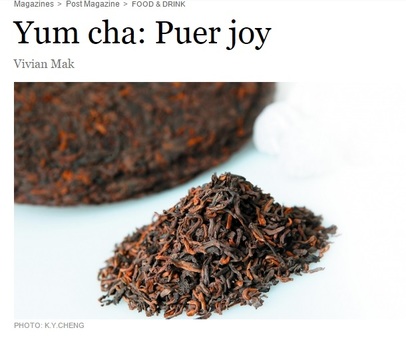Black Teas
|
The annual Hong Kong International Tea Fair was held last month and, among the stars of the show was, as usual, puer.
The variety is commonly described as earthy - a customer once asked whether soil had been added to one of ours! It is one of the teas offered in almost all Chinese restaurants in Hong Kong, where it's usually ordered with dim sum as it is believed puer helps digestion by rinsing away fat and grease. The colour of the version found in restaurants is dark and the taste ranges from light to chokingly bitter. You will often see compressed puer cakes, or bricks, wrapped in paper. Merchants will tell you that these cakes improve with time, so if you collect a good batch they might be worth a fortune some day - and people do collect them. Puer comes from Yunnan province and is a post-fermented tea (which means, essentially, that it goes through an ageing process). Traditionally, puer production results in a lightly fermented tea that is not fully oxidised and is referred to as "raw". The tea is then pressed into cakes, stored and allowed to mature. Microbial action will ferment the tea, causing it to darken and develop the characteristic earthy flavour. This method of maturing, however, is dependent on the environment and humidity; temperature and airflow can affect the taste. If it is not stored properly, even the highest quality puer can become undrinkable. Another method of production speeds up the ageing process through wo dui, or wet piling. The tea is placed into thick piles and either water is sprayed onto it or the humidity is controlled to encourage microbial and fungal growth. The tea is periodically checked and mixed, ensuring even fermentation. Up to a month later, the tea is rolled and baked, or simply dried, resulting in what is known as "ripe" puer, which can be used immediately or further matured. Both loose and cake forms are produced in this way. |
So what is the story behind these expensive tea cakes? If you have been following this column, you will remember that in ancient China, all tea was produced in cake form - but only because that made it easy to store and transport. Eventually, a Ming dynasty emperor realised loose-leaf tea had more potential for flavour development and stopped the production of cakes.
The price of tea cakes and the associated culture of speculation are not necessarily derived from the quality of the product. In fact, expensive tea cakes can vary drastically in quality; exceptional examples deserve to be costly but even a low-quality tea can sell for an extremely high price, based merely on its year of production. Unjustifiably high price tags are, therefore, mostly a contrivance designed to make dealers more money. Loose-leaf puer deserves more credit than it's given. The fact is, loose-leaf puer can be of very high quality and is likely to mature better because each leaf is in contact with the air. In puer cakes, the inner leaves are completely blocked off. Puer should be stored in an airtight container, away from light and humidity. When buying tea, it is important not to be swayed by hype and trends. Puer is very dark and looks like it should taste very strong but a good variety is rich yet mellow, is full bodied and can have sweet after tones. In brewing puer, remember to use boiling water - and to first rinse the tea by pouring boiling water into the pot and quickly decanting it. Puer is good with or after meals, as it is warming, helps digestion and shouldn't keep you up at night. If you have a weak stomach or have trouble going to the loo, a daily cup of puer should prove beneficial. http://www.scmp.com/magazines/post-magazine/article/1303131/yum-cha-puer-joy |

